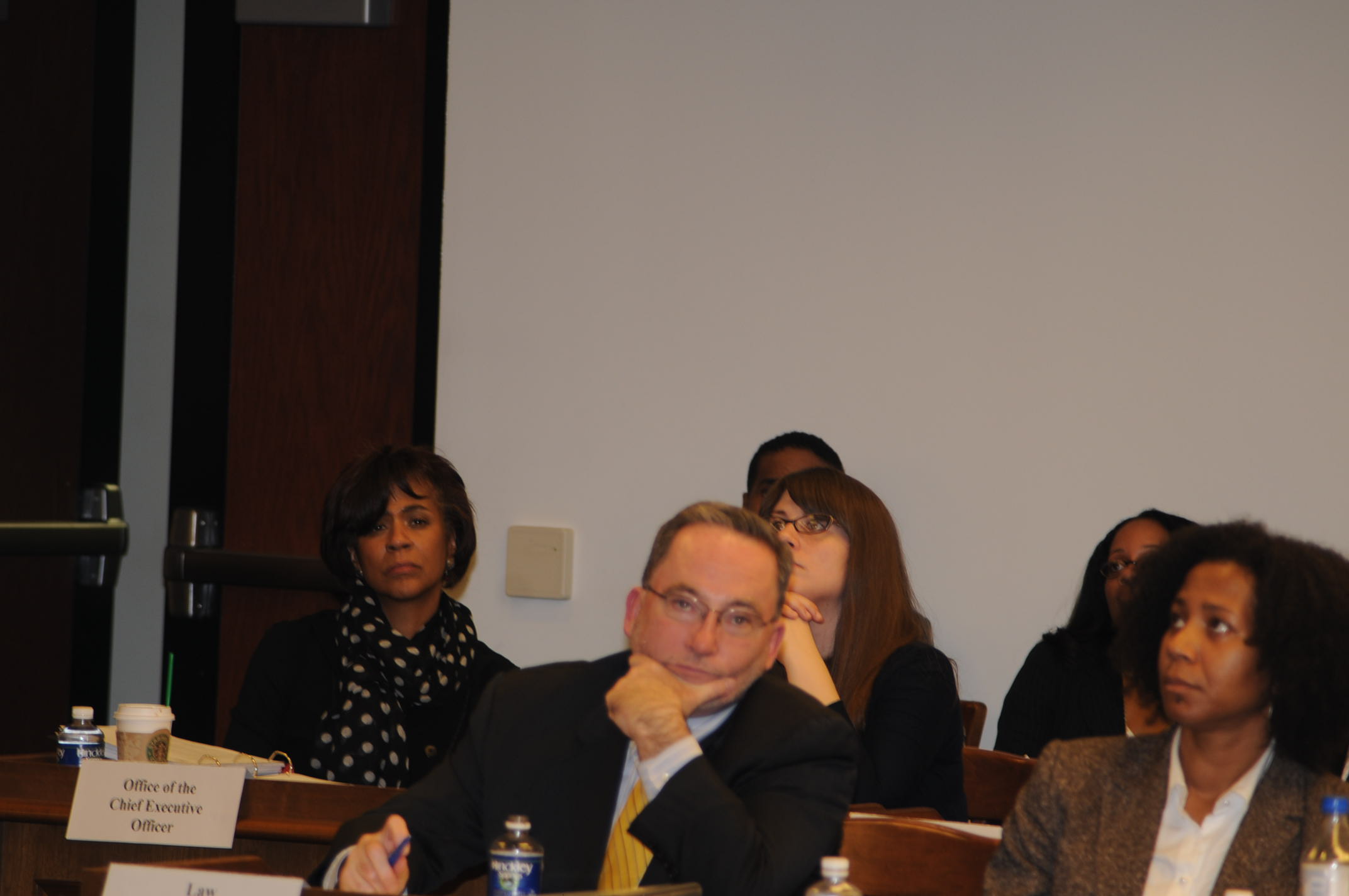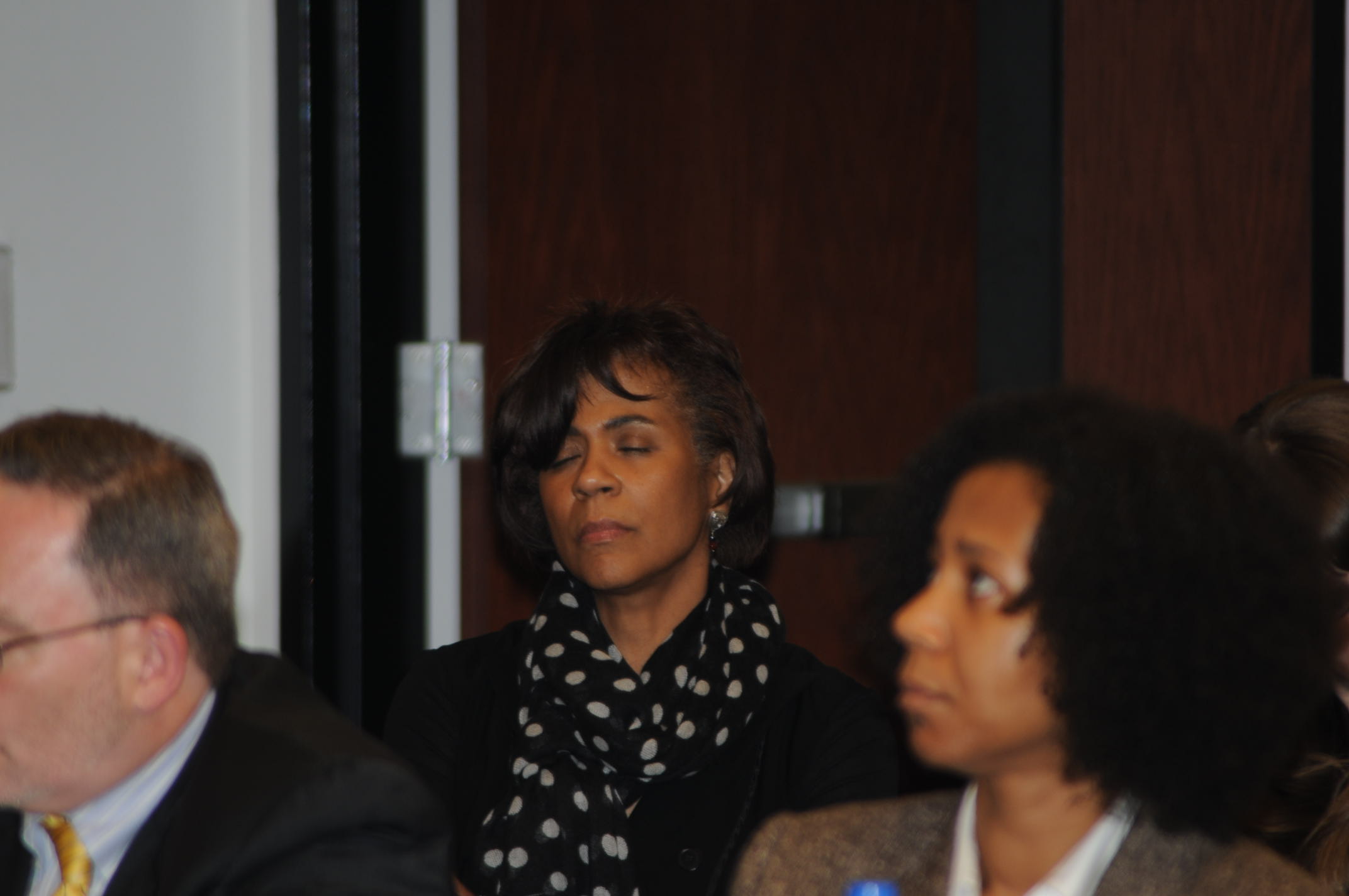Peggy Davis gets an earful from Johnson School principal, teachers, parents...Third Board of Education members drops in on 'turnaround' and other closings hearings
She was so unobtrusive that many people didn't realize she had entered the Board of Education chambers until she raised her hand when Wanda Hopkins, of PURE, demanded: "And are there any Board of Education members here today?"
 Attorney Peggy Davis (above, left) briefly attended the "turnaround" hearing on Johnson Elementary School on February 5, 2009, making Davis the third member of the seven-member Board to drop in on the hearings since they began January 26. Also above: Joseph Moriarity (Deputy General Counsel, Chicago Public Schools,staring at camera, chin in hand) and Diana Matthews (Office of New Schools, Chicago Public Schools). Moriarity and Matthews deliver a major portion of the CPS "case" for "turnaround" at each of the turnaround hearings taking place this week and next. Substance photo by George N. Schmidt. In a seat marked "Office of the Chief Executive Officer," Chicago Board of Education member Peggy Davis, who once served as CEO Arne Duncan's chief of staff and who is now an attorney for Exelon, raised her hand and said, "Yes."
Attorney Peggy Davis (above, left) briefly attended the "turnaround" hearing on Johnson Elementary School on February 5, 2009, making Davis the third member of the seven-member Board to drop in on the hearings since they began January 26. Also above: Joseph Moriarity (Deputy General Counsel, Chicago Public Schools,staring at camera, chin in hand) and Diana Matthews (Office of New Schools, Chicago Public Schools). Moriarity and Matthews deliver a major portion of the CPS "case" for "turnaround" at each of the turnaround hearings taking place this week and next. Substance photo by George N. Schmidt. In a seat marked "Office of the Chief Executive Officer," Chicago Board of Education member Peggy Davis, who once served as CEO Arne Duncan's chief of staff and who is now an attorney for Exelon, raised her hand and said, "Yes."
For the second night in a row, a member of the seven-member Chicago Board of Education had arrived for one of the "turnaround" hearings at the headquarters of the nation's third largest school system. Previously, Board President Rufus Williams and Board member Alberto Carrero had attended portions of the hearings. Williams was at the hearing on the proposed closing of South Chicago Elementary School on January 29. Carrero sat through the entire hearing on the proposed "turnaround" of Dulles Elementary School on February 5.
None has yet commented to the public about what they heard, but all three heard stories about the challenges of educating children whose lives are scarred by extreme poverty and the violence of a lifetime spent in segregated ghetto schools where teachers collect clothing for the children and children "steal" cereal in the school lunchrooms because it may be the only food they will get that day (as one tearful teacher testified while Carrero listened impassively on February 5).
If the members of the Chicago Board of Education vote to "turnaround" Bethune, Dulles, Holmes, Johnson, and Yale elementary schools -- along with Fenger High School -- Chicago's school board will have once again given its stamp of approval to the massive segregation (by race, ethnicity, and poverty) that characterize the city created by the man who appointed them to the school board because of their business experience and corporate loyalties.
 Chicago Board of Education member Peggy Davis (center) while Wanda Hopkins of PURE was speaking in defense of Johnson Elementary School at the February 6 "turnaround" hearing. To the right in the above photograph is Diana Matthews, of the "Office of New Schools" of CPS, which has overseen the creation of the Academy of Urban School Leadership to promote the reconstitution of segregated ghetto schools like Johnson, Bethune, Dulles, Holmes, Yale (and Fenger High School). Substance photo by George N. Schmidt.Although Davis's career with Chicago Public Schools began as an official (Chief of Staff during the early years of the term of Arne Duncan as CEO), beginning in 2006 she was a member of the (unpaid) Chicago Board of Education.
Chicago Board of Education member Peggy Davis (center) while Wanda Hopkins of PURE was speaking in defense of Johnson Elementary School at the February 6 "turnaround" hearing. To the right in the above photograph is Diana Matthews, of the "Office of New Schools" of CPS, which has overseen the creation of the Academy of Urban School Leadership to promote the reconstitution of segregated ghetto schools like Johnson, Bethune, Dulles, Holmes, Yale (and Fenger High School). Substance photo by George N. Schmidt.Although Davis's career with Chicago Public Schools began as an official (Chief of Staff during the early years of the term of Arne Duncan as CEO), beginning in 2006 she was a member of the (unpaid) Chicago Board of Education.
According to the official biographical material currently on the (outdated) CPS website (www.cps.k12.il.us):
"Peggy A. Davis was appointed by Mayor Richard M. Daley as a Member of the Chicago Board of Education in September 2006. Ms. Davis also serves as a Board Trustee to the Public School Teachers' Pension and Retirement Fund of Chicago. Ms. Davis is currently the Vice President of Diversity and Compliance at the Exelon Business Services Corporation. She was a former partner in the government relations and labor and employment practices in the Chicago office of Winston & Strawn LLP. She also has extensive experience in the public sector, including her most recent service as chief of staff to the Chicago Public Schools CEO. She served nine years as general counsel to the Metropolitan Pier and Exposition Authority, and , also worked for the City of Chicago’s law department and the Chicago office of the Equal Employment Opportunity Commission. Ms. Davis is a graduate of the University of Wisconsin Milwaukee, where she received a bachelor’s degree in social welfare and a Juris Doctor degree from their Law School. She is licensed to practice in state and federal courts in Illinois and Wisconsin. Ms. Davis is a member of the American Bar Association and the Chicago Bar Association. She is the outgoing president of the Lawyers Trust Fund of Illinois; treasurer-elect for the National Association of Women Lawyers; and active in other civic organizations."
The often emotional testimony of the parents, teachers and principal of James Weldon Johnson Elementary School was delivered while Davis listened impassively. Later, one of the teacher who testified asked whether they might have moved her by singing "Lift Every Voice and Sing" -- once known as the "Black National Anthem". The song, written as a poem, was composed by the African American poet for whom the soon-to-be-turned around school is named.
The majority of teachers and all of the students at Johnson Elementary School are African American. All of the non-teaching staff are African American. All of the students are African American and living in extreme poverty in one of the poorest communities in North America.
The words of "Lift Every Voice and Sing" are as follows:
Lift Every Voice and Sing
By James Weldon Johnson
Lift ev'ry voice and sing,
Till earth and heaven ring,
Ring with the harmonies of Liberty;
Let our rejoicing rise
High as the list'ning skies,
Let it resound loud as the rolling sea.
CHORUS:
Sing a song full of the faith that the dark past has taught us,
Sing a song full of the hope that the present has brought us;
Facing the rising sun of our new day begun,
Let us march on till victory is won.
Stony the road we trod,
Bitter the chast'ning rod,
Felt in the days when hope unborn had died;
Yet with a steady beat,
Have not our weary feet
Come to the place for which our fathers sighed?
We have come over a way that with tears has been watered.
We have come, treading our path through the blood of the slaughtered,
Out from the gloomy past,
Till now we stand at last
Where the white gleam of our bright star is cast.
CHORUS:
Sing a song full of the faith that the dark past has taught us,
Sing a song full of the hope that the present has brought us;
Facing the rising sun of our new day begun,
Let us march on till victory is won.
God of our weary years,
God of our silent tears,
Thou who hast brought us thus far on the way;
Thou who hast by Thy might,
Led us into the light,
Keep us forever in the path, we pray.
Lest our feet stray from the places, our God, where we met Thee,
Lest our hearts, drunk with the wine of the world, we forget Thee;
Shadowed beneath Thy hand,
May we forever stand,
True to our God,
True to our native land.
CHORUS:
Sing a song full of the faith that the dark past has taught us,
Sing a song full of the hope that the present has brought us;
Facing the rising sun of our new day begun,
Let us march on till victory is won.
Although some at the Johnson School "turnaround" hearing discussed singing the song, none did. One parent leader asked: "How many of those people sitting with the Board know the words of that song and what it means to us?"
For many, the vote of the Chicago Board of Education to try and end federal court oversight of the school system under a 1980 desegregation consent decree is part of what is taking place in the hearing rooms of this year's "turnaround" battles. During the 50 years since the U.S. Supreme Court ruled that racial segregation of public schools was unconstitutional in the USA, Chicago has created the most racially segregated public school system in the USA, with more than 300 public schools that are all-African American (and most, all-poor).
Since the creation of "Renaissance 2010" in 2004 at the behest of Chicago Mayor Richard M. Daley, Chicago has been in the process of creating a new segregated school system within itself. Chicago's charter schools, championed by the members of the Chicago Board of Education, are now a segregated sub-system of the Chicago system. Not one member of the Chicago Board of Education has ever asked at a public meeting whether charter schools are complying with federal desegregation law.
For others, it was a reminder that people who faced fire hoses and worse to desegregate the USA during the years of Civil Rights and Brown v. Board of Education have bequeathed a legacy to men and women who have profited from the struggles Johnson's poem sings.
A COMPLETE VERSION OF THIS STORY WILL APPEAR IN THE PRINT EDITION OF SUBSTANCE, TO BE PUBLISHED AND MAILED TO ALL PRINT SUBSCRIBERS FEBRUARY 17, 2009.

